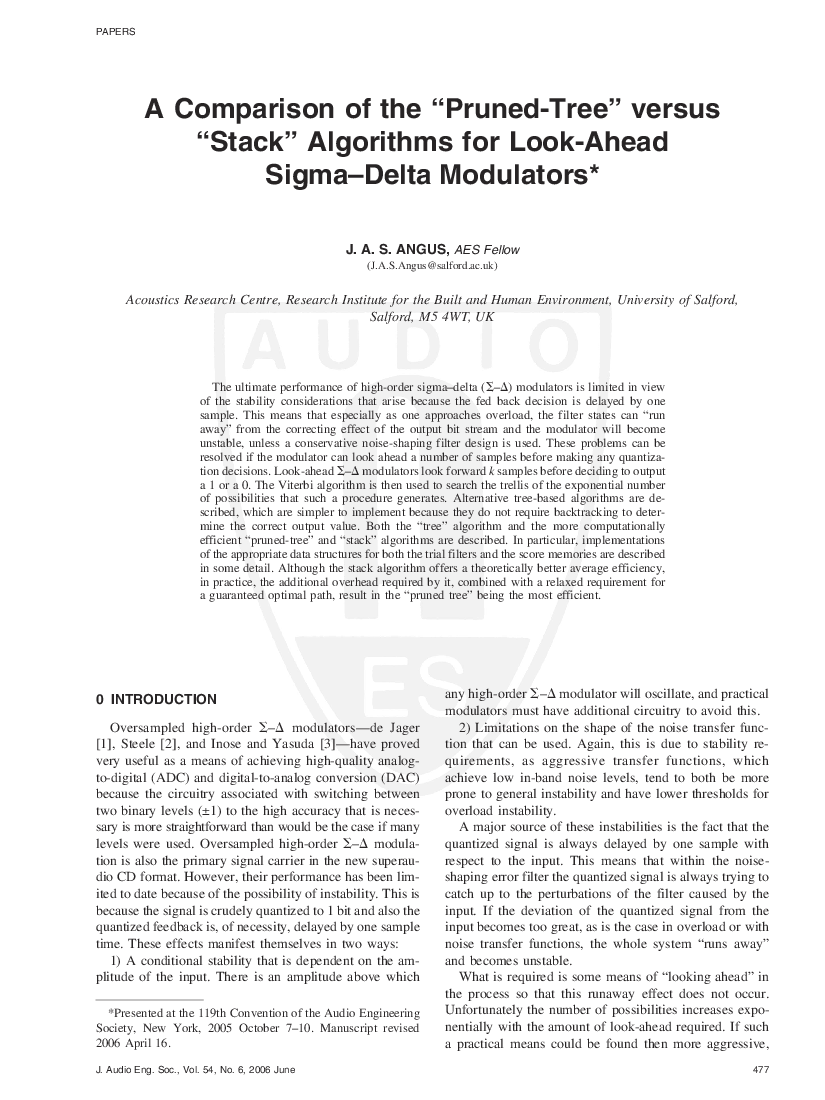Home / Publications / E-library page
You are currently logged in as an
Institutional Subscriber.
If you would like to logout,
please click on the button below.
Home / Publications / E-library page
Only AES members and Institutional Journal Subscribers can download
The ultimate performance of high-order sigma–delta ( – ) modulators is limited in view of the stability considerations that arise because the fed back decision is delayed by one sample. This means that especially as one approaches overload, the filter states can “run away” from the correcting effect of the output bit stream and the modulator will become unstable, unless a conservative noise-shaping filter design is used. These problems can be resolved if the modulator can look ahead a number of samples before making any quantization decisions. Look-ahead – modulators look forward k samples before deciding to output a 1 or a 0. The Viterbi algorithm is then used to search the trellis of the exponential number of possibilities that such a procedure generates. Alternative tree-based algorithms are described, which are simpler to implement because they do not require backtracking to determine the correct output value. Both the “tree” algorithm and the more computationally efficient “pruned-tree” and “stack” algorithms are described. In particular, implementations of the appropriate data structures for both the trial filters and the score memories are described in some detail. Although the stack algorithm offers a theoretically better average efficiency, in practice, the additional overhead required by it, combined with a relaxed requirement for a guaranteed optimal path, result in the “pruned tree” being the most efficient.
Author (s): Angus, Jamie A. S.
Affiliation:
University of Salford, Salford, UK
(See document for exact affiliation information.)
Publication Date:
2006-06-06
Import into BibTeX
Permalink: https://aes2.org/publications/elibrary-page/?id=13687
(1092KB)
Click to purchase paper as a non-member or login as an AES member. If your company or school subscribes to the E-Library then switch to the institutional version. If you are not an AES member Join the AES. If you need to check your member status, login to the Member Portal.

Angus, Jamie A. S.; 2006; A Comparison of the “Pruned-Tree” versus “Stack” Algorithms for Look-Ahead Sigma–Delta Modulators [PDF]; University of Salford, Salford, UK; Paper ; Available from: https://aes2.org/publications/elibrary-page/?id=13687
Angus, Jamie A. S.; A Comparison of the “Pruned-Tree” versus “Stack” Algorithms for Look-Ahead Sigma–Delta Modulators [PDF]; University of Salford, Salford, UK; Paper ; 2006 Available: https://aes2.org/publications/elibrary-page/?id=13687